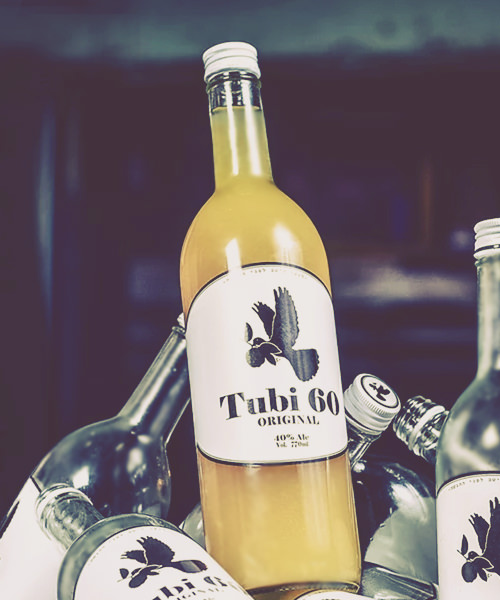Meet Tubi 60, Israel’s best unkept secret you’ve probably never heard of. A cult favorite among those who have been to Israel, Tubi was little known outside the Holy Land. But the brand recently announced that they would begin selling in the U.S., which is excellent news for those in the know and those who are about to get their first sip of the stuff.
The mysterious liquor is an entity unto its own, a cloudy, yellow beverage with a citrusy bite and herbal undertones. Its logo is “Pure Happiness,” and there are few fans who would argue with that. For the small handful of Americans who’ve tried Tubi, its recent arrival in the States is a dream come true. The liquor’s sharp, pungent aroma is a portal to hazy Thursday nights downing shots of Tubi in a grungy hipster Tel Aviv club that smells like cigarettes and sounds like Berlin house beats.
Tubi now lines the shelves of Texas liquor stores, and will soon be arriving in New York. For anyone else in America, it can be ordered online. And in addition to the States, Tubi will also be exporting to Germany, Hungary, and Norway.
The distinctive liquor was invented in 2012 by two brothers, Hilal and Yanai Tubi, who worked out of their parents’ apartment in the northern Israeli city of Haifa. They say the idea was to create an alcohol that was “superior” to any other in terms of ingredients, taste, effect, and versatility. By 2013, the success of the brand and growing demand meant the brothers had to move from their parents’ home into their first factory in Haifa, and their continued success found them struggling to keep up with the liquor’s growth demand. By 2014, they were distributing Tubi around the entire country, and by 2015, they’d moved into an even bigger factory.
The spirit is 40 percent alcohol and made from lemons, herbs, flower, and tree extracts. It’s “specifically formulated to provide an uplifting and positive effect,” according to its website. Tubi’s vague herbal blend leaves much to the imagination, but the drink is approved both by the Israeli Health Ministry and now by the FDA.
And contrary to the rumors, while a night spent sipping Tubi does give you a certain kind of energy, it doesn’t contain any khat, an herbal stimulant whose leaves are commonly chewed in East Africa and the Arabian peninsula. “It does, however, make you very happy,” a Tubi spokesperson says.
On first sip, some may grimace at its bitter punch. But the drink’s seductive, enigmatic allure usually leaves people asking for more. Despite having been relatively under the radar — Tubi has had no advertising whatsoever — it’s accumulated a loyal, if not also a bit culty, following.
“It got popular in Israel only because of public demand,” the spokesperson says. “People liked it and started to ask for it in bars. The rest is history.”
